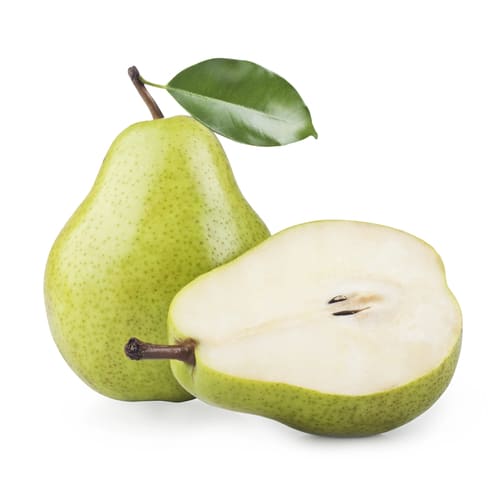 The pear is a sweet and juicy fruit with a thin skin. Most people enjoy eating raw pears, but they also taste particularly good when added to salads or to recipes involving blue cheese. As it turns out, these fruits are also packed with nutrients that make them particularly good for your health. Read on to discover eleven interesting and significant reasons why you should include more pears in your diet.
The pear is a sweet and juicy fruit with a thin skin. Most people enjoy eating raw pears, but they also taste particularly good when added to salads or to recipes involving blue cheese. As it turns out, these fruits are also packed with nutrients that make them particularly good for your health. Read on to discover eleven interesting and significant reasons why you should include more pears in your diet.
1) They are hypoallergenic:
Pears are a hypoallergenic fruit, and this means that they are suitable for almost all people who are on restricted diets. Indeed, they are the only fruit that people on elimination diets can eat while doctors are trying to identify their allergies. However, it is important to note that the small group of people who are allergic to Alder or Birch pollen may in rare cases have an allergic reaction to pears as well.
2) They may help to protect against breast cancer:
Studies conducted on postmenopausal women have revealed that regularly eating pears can help to reduce their risk of suffering from breast cancer. Specifically, these women were 34% less likely to develop any form of breast cancer.
3) They improve heart health:
Like all fruits that contain pectin, pears can help to keep cholesterol levels within healthy limits. Pears actually contain even more pectin than apples, which are famous for their ability to reduce cholesterol levels. The fiber in pears can also bind to bile salts and carry them out of the body through the intestines, leading to an additional lowering of cholesterol levels. The average pear contains as much as 25% of your recommended daily intake of fiber, making it one of the best foods to eat if you are interested in heart health. Finally, pears contain the antioxidant glutathione, which has been shown to reduce blood pressure and make you up to 50% less likely to suffer from a stroke.
4) They reduce your likelihood of developing cancer of the digestive system:
Pears are a source of hydroxycinnamic acid, and studies have proven that this acid helps to prevent cancers of the stomach. Secondly, the fact that the fiber in pears is mostly insoluble means that it can reduce the occurrence of pre-cancerous polyps in the colon.
5) They can provide you with a quick energy boost:
Pears contain two monosaccharaides, fructose and glucose. Both of these sugars will give you a quick and substantial increase in energy. This means that pears can be a particularly good snack if you are prone to experiencing a slump in the late afternoon (between lunch and dinner).
6) They reduce the risk of birth defects:
Pears contain around 5% of your recommended daily intake of folate. This is important if you are pregnant, as folate has been repeatedly proven to help prevent neural tube defects in developing babies.
7) They are extremely effective at preventing constipation:
Pears contain plenty of sorbitol, which helps to regulate bowel movements. In addition, pears are very high in fiber (as mentioned above). These two traits combine to make the pear an excellent choice if you tend suffer from problems with constipation.
8) They strengthen bones:
Pears are a source of boron, which your body needs in order to retain the right amount of calcium. Having the right amount of calcium at your disposal makes you much less likely to suffer from osteoporosis or brittle bones.
9) They may help to prevent asthma:
One study performed by Australian scientists suggests that those who regularly consume pears are the least likely to develop asthma. This conclusion warrants further investigation, but the research is promising.
10) They promote eye health:
People who eat lots of fruits that are particularly rich in antioxidants are over 35% less likely to end up suffering from macular degeneration. This is a particularly important health benefit if you are an older person, as macular denegation is the primary cause of partial (or sometimes full) blindness in the elderly.
11) They can help to wean children:
Children rarely have problems digesting pears, so they are a good choice during the weaning period. In addition, the hypoallergenic nature of pears means that parents can feel safe in the knowledge that feeding pear to their children is unlikely to produce an adverse reaction.
As is obvious from the above health benefits, pears are an excellent choice if you want to increase your daily intake of fruits and vegetables. You can find pears on sale all year, but the main season is between August and October. To check whether a pear is ripe, apply light pressure to the neck of the pear. The fruit is ready to eat if a small dent appears under your finger.
Related Articles By Cathe:
Eleven Fascinating Health Benefits of Avocados
Nine Fascinating Health Benefits of Almonds
Twelve Fascinating Health Benefits of Papaya
Nine Amazing Health Benefits of Green Peas
Twelve Amazing Health Benefits of Strawberries
Ten Fascinating Health Benefits of Broccoli

